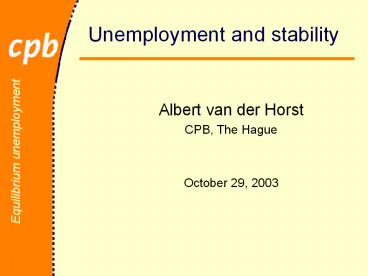Unemployment and stability - PowerPoint PPT Presentation
Title:
Unemployment and stability
Description:
Equilibrium unemployment. Unemployment and stability. Albert van der Horst. CPB, The Hague ... Competition and harmonization in Europe (a Level Playing Field) Workshop ... – PowerPoint PPT presentation
Number of Views:15
Avg rating:3.0/5.0
Title: Unemployment and stability
1
Unemployment and stability
- Albert van der Horst
- CPB, The Hague
- October 29, 2003
2
Just a minute
- European comparative analysis
- EU enlargement (immigration)
- Tax competition in the European Union
- Regional policy (geographical economics)
- European labor markets
- Competition and harmonization in Europe (a Level
Playing Field) - Workshop
- Stability and growth pact (January 9, 2004)
3
Outline
- Equilibrium unemployment
- our approach
- in Europe
- structural growth
- versus the EC approach
- stability and growth pact
4
Stable?
5
Equilibrium
- Equilibrium is central in economic theory
- equilibrium where we go
- today where we come from
- Unemployment is a persistent phenomenon
- demand supply fails
- short-run imperfections are insufficient
- seems to be a stable equilibrium
6
Equilibrium unemployment
Labor supply
W
Labor demand
-- u --
Wage curve
L
7
Wage negotiations
- Firms prefer low labor income share
- opt for low wages
- Workers prefer high wage income
- take into account that unemployment leads to a
reduction in income - Negotiations
- gt tax shifting sharing
- role of benefits (replacement rate)
8
Wage equation
Tax RR w(min) u(-1) Stationary
France 0 0,14 0,25 -0,79 yes
Germany 0,73 0 -2,10 yes
The Netherlands 0,13 0,75 -1,07 yes
Spain 0,21 0,25 -0,68 yes
United Kingdom 0,20 0,05 -0,79 yes
United States 0 -0,40 no
9
Labor demand
- Firms maximize profits
- Higher wages reduce profits
- Reduction in employment improves profits
- Substitution between labor and capital
10
Equilibrium unemployment
- Equilibrium unemployment rate depends on
- Tax wedge
- Benefits
- Minimum wage rate
- Interest rate
11
France and Germany
12
The Netherlands and Spain
13
United Kingdom
14
Labor tax and unemployment
- Higher labor tax (1 GDP)
- raises equilibrium unemployment immediately
- raises actual unemployment gradually
Jade simulation
15
Labor tax and growth
- A tax increase
- reduces structural GDP immediately
- reduces actual production gradually
- creates positive output gap (dotted line)
Jade simulation
16
Structural growth
- Y depends on
- Labor supply
- Labor productivity
- Equilibrium unemployment
CPB EC
LS Projection HP filter
Y/L HP filter HP filter
U Equilibrium NAIRU
17
EC Nairu
- Alternative approach by the European Commission
- trend estimate
- depend on change in inflation rate
- backward looking
18
Labor tax and unemployment (2)
- Higher labor tax (1 GDP)
- raises actual unemployment gradually
- raises equilibrium unemployment gradually, but
even before the implementation date
19
Labor tax and growth (2)
- A tax increase
- reduces structural GDP gradually
- reduces actual production gradually
- slightly positive output gap initially (dotted
line)
20
Meet the EMU-norm
- What if a country proposes the EC to improve its
budget by raising its labor tax rate (by 1 GDP) - Choice 1 does the EC take negative growth
effects into account? - If yes, how?
- Structural approach
- ?EMU lt 1 GDP
- Positive output gap ?EMU(structural) lt ?EMU
- EC approach
- ?EMU lt 1 GDP
- Small output gap ?EMU(structural) ?EMU
21
Towards SGP
- The impact of tax changes differ between
countries - It is therefore suboptimal to opt for a single
fiscal regime































